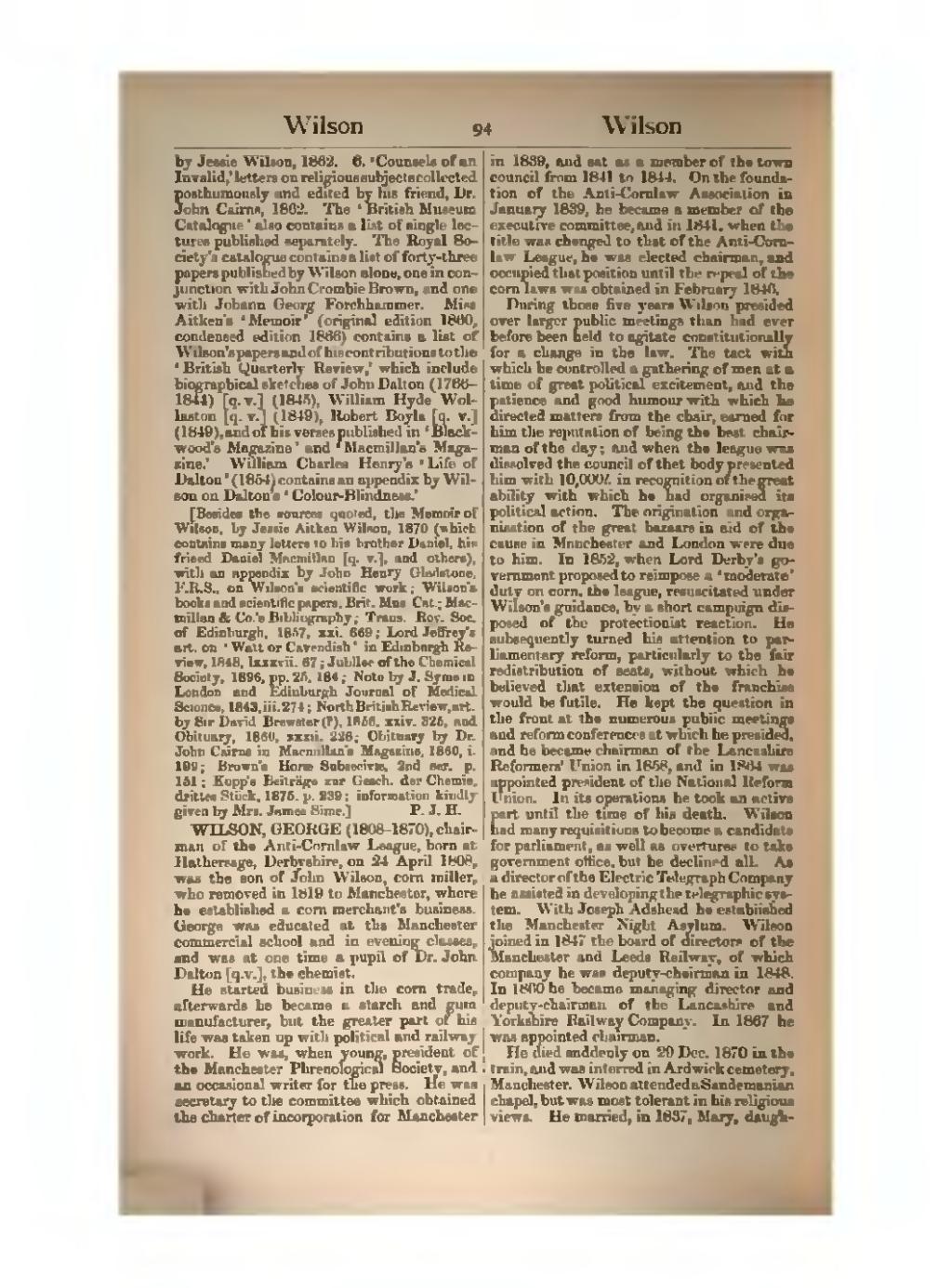by Jessie Wilson, 1862.
- ‘Counsels of an Invalid,’ letters on religious subjects collected posthumously and edited by his friend, Dr. John Cairns, 1862.
The ‘British Museum Catalogue’ also contains a list of single lectures published separately. The Royal Society's catalogue contains a list of forty-three papers published by Wilson alone, one in conjunction with John Crombie Brown, and one with Johann Georg Forchhammer. Miss Aitken's ‘Memoir’ (original edition 1860, condensed edition 1866) contains a list of Wilson's papers and of his contributions to the ‘British Quarterly Review,’ which include biographical sketches of John Dalton (1766–1844) [q. v.] (1845), William Hyde Wollaston [q. v.] (1849), Robert Boyle [q. v.] (1849), and of his verses published in ‘Blackwood's Magazine’ and ‘Macmillan's Magazine.’ William Charles Henry's ‘Life of Dalton’ (1854) contains an appendix by Wilson on Dalton's ‘Colour-Blindness.’
[Besides the sources quoted, the Memoir of Wilson, by Jessie Aitken Wilson, 1870 (which contains many letters to his brother Daniel, his friend Daniel Macmillan [q. v.], and others), with an appendix by John Henry Gladstone, F.R.S., on Wilson's scientific work; Wilson's books and scientific papers; Brit. Mus. Cat.; Macmillan & Co.'s Bibliography; Trans. Roy. Soc. of Edinburgh, 1857, xxi. 669; Lord Jeffrey's art. on ‘Watt or Cavendish’ in Edinburgh Review, 1848, lxxxvii. 67; Jubilee of the Chemical Society, 1896, pp. 25, 184; Note by J. Syme in London and Edinburgh Journal of Medical Science, 1843, iii. 274; North British Review, art. by Sir David Brewster (?), 1856, xxiv. 325, and Obituary, 1860, xxxii. 226; Obituary by Dr. John Cairns in Macmillan's Magazine, 1860, i. 199; Brown's Horæ Subsecivæ, 2nd ser. p. 151; Kopp's Beiträge zur Gesch. der Chemie, drittes Stück, 1875, p. 239; information kindly given by Mrs. James Sime.]
WILSON, GEORGE (1808–1870), chairman of the Anti-Cornlaw League, born at Hathersage, Derbyshire, on 24 April 1808, was the son of John Wilson, corn miller, who removed in 1819 to Manchester, where he established a corn merchant's business. George was educated at the Manchester commercial school and in evening classes, and was at one time a pupil of Dr. John Dalton [q. v.], the chemist.
He started business in the corn trade, afterwards he became a starch and gum manufacturer, but the greater part of his life was taken up with political and railway work. He was, when young, president of the Manchester Phrenological Society, and an occasional writer for the press. He was secretary to the committee which obtained the charter of incorporation for Manchester in 1839, and sat as a member of the town council from 1841 to 1844. On the foundation of the Anti-Cornlaw Association in January 1839, he became a member of the executive committee, and in 1841, when the title was changed to that of the Anti-Cornlaw League, he was elected chairman, and occupied that position until the repeal of the corn laws was obtained in February 1846.
During those five years Wilson presided over larger public meetings than had ever before been held to agitate constitutionally for a change in the law. The tact with which he controlled a gathering of men at a time of great political excitement, and the patience and good humour with which he directed matters from the chair, earned for him the reputation of being the best chairman of the day; and when the league was dissolved the council of that body presented him with 10,000l. in recognition of the great ability with which he had organised its political action. The origination and organisation of the great bazaars in aid of the cause in Manchester and London were due to him. In 1852, when Lord Derby's government proposed to reimpose a ‘moderate’ duty on corn, the league, resuscitated under Wilson's guidance, by a short campaign disposed of the protectionist reaction. He subsequently turned his attention to parliamentary reform, particularly to the fair redistribution of seats, without which he believed that extension of the franchise would be futile. He kept the question in the front at the numerous public meetings and reform conferences at which he presided, and he became chairman of the Lancashire Reformers' Union in 1858, and in 1864 was appointed president of the National Reform Union. In its operations he took an active part until the time of his death. Wilson had many requisitions to become a candidate for parliament, as well as overtures to take government office, but he declined all. As a director of the Electric Telegraph Company he assisted in developing the telegraphic system. With Joseph Adshead he established the Manchester Night Asylum. Wilson joined in 1847 the board of directors of the Manchester and Leeds Railway, of which company he was deputy-chairman in 1848. In 1860 he became managing director and deputy-chairman of the Lancashire and Yorkshire Railway Company. In 1867 he was appointed chairman.
He died suddenly on 29 Dec. 1870 in the train, and was interred in Ardwick cemetery, Manchester. Wilson attended a Sandemanian chapel, but was most tolerant in his religious views. He married, in 1837, Mary, daugh-
